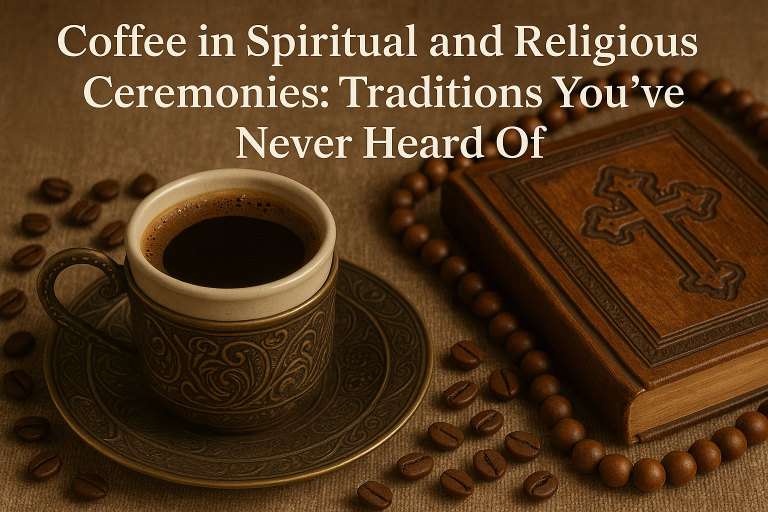
For many, coffee is the fuel of waking life — a morning necessity, a midday pick-me-up, or a cozy evening companion. But what happens when we drink coffee close to bedtime?
Could that cup of java do more than disrupt your sleep? Could it actually shape your dreams, or alter the way your subconscious works overnight?
It turns out that the relationship between coffee and dreaming is more complex — and mysterious — than we might expect.
In this article, we’ll explore how caffeine affects sleep patterns, what science says about coffee and dreaming, and how cultures throughout history have connected coffee to the spiritual and symbolic realm of sleep.
Caffeine is a stimulant, and its primary target in the body is a molecule called adenosine. Adenosine is responsible for promoting sleep and relaxation. As adenosine levels build up throughout the day, you feel more tired — until you rest.
Caffeine blocks adenosine receptors, temporarily preventing drowsiness. This is why coffee helps you feel alert and focused. But it also means that caffeine can delay the onset of sleep, reduce overall sleep time, and decrease deep sleep.
Studies show that caffeine consumed even 6 hours before bedtime can significantly reduce sleep quality.
So it’s no surprise that drinking coffee in the evening may lead to:
But there’s more to the story.
REM (Rapid Eye Movement) sleep is the stage of sleep where dreams are most vivid. This phase is essential for emotional regulation, memory consolidation, and mental health.
When caffeine interferes with REM sleep, it may:
Interestingly, some people report the opposite: drinking coffee late in the day leads to weird, intense dreams or more frequent dream recall. How can both be true?
Let’s dive deeper.
If you’re a heavy coffee drinker, your body becomes used to a steady stream of caffeine throughout the day. When you sleep — and that supply stops — your body may experience mild withdrawal.
This shift in brain chemistry can:
So in some cases, caffeine may disrupt REM sleep. But in others, withdrawal from caffeine may cause more REM activity later in the night.
The result? Vivid, strange, or memorable dreams.
Some lucid dreamers — people who are aware they’re dreaming and can sometimes control their dreams — have experimented with using caffeine strategically to influence their dream state.
One common technique is the Wake-Back-to-Bed Method (WBTB):
This method aims to increase alertness slightly just before returning to REM sleep, potentially triggering lucid dreams.
Why does it work?
It’s not foolproof, but some dreamers report success — especially with small doses of coffee or green tea.
In Western culture, coffee is seen as a wake-up drink — the opposite of sleep. But in other traditions, it has deeper associations with the subconscious and spirit realm.
Sufi mystics in the Islamic world have historically used coffee to stay awake for spiritual rituals and meditation. Some believed that during extended wakefulness, they could enter altered states or gain divine insight.
The connection between coffee and spiritual clarity made it a tool for exploring consciousness — not unlike the dream state.
In Ethiopia, the birthplace of coffee, traditional ceremonies are often performed in the evening. The third and final round of coffee, baraka, is associated with blessing and reflection — sometimes followed by storytelling or symbolic discussions.
Some families even speak of dreams or ancestors during these moments, connecting the end of the day’s coffee ritual to the inner world of sleep.
In some people, yes — especially those sensitive to caffeine or prone to anxiety.
Caffeine increases heart rate, stimulates the nervous system, and can heighten emotional reactivity. These effects don’t stop just because you’re asleep. If your body is agitated during rest, your dreams may reflect that tension.
Possible outcomes include:
People with PTSD or sleep disorders are more likely to be affected this way. Reducing or avoiding caffeine late in the day can improve both sleep quality and dream tone.
Sometimes, it’s not the coffee itself that affects dreams — it’s the ritual around it.
Drinking coffee at night can serve as a form of reflection or transition. Just like journaling or meditation, the ritual can signal the brain: “It’s time to unwind.”
For example:
In these cases, coffee becomes a tool for emotional closure at the end of the day.
If you love the idea of coffee before bed but don’t want to disrupt your sleep, try these alternatives:
Look for naturally caffeine-free options like:
These mimic the taste and warmth of coffee without interfering with sleep.
As we explored earlier, the smell of coffee can have powerful emotional effects. Using coffee-scented candles or essential oils may provide comfort or dream stimulation without ingesting caffeine.
Create a nighttime habit of:
This creates a bridge between your conscious and subconscious mind.
It depends. If caffeine keeps you awake or causes anxiety, it’s best to stop drinking coffee at least 6 hours before bed.
But if you:
…you may find that nighttime coffee becomes part of a subtle, symbolic routine.
Coffee can disrupt, stimulate, or even guide your dreams — depending on your body, mindset, and intention.
So next time you consider an evening brew, ask yourself: is this cup about energy, or about entry — into the inner landscapes of the mind?

Gabriel Rodrigues é especialista em finanças pessoais e escritor, com ampla experiência em economia, planejamento financeiro e gestão de recursos. Apaixonado por ajudar as pessoas a alcançarem sua saúde financeira, ele explora temas variados, desde investimentos até estratégias de poupança. Quando não está escrevendo, você pode encontrá-lo estudando novas tendências financeiras e oferecendo consultoria para quem busca melhorar sua relação com o dinheiro.